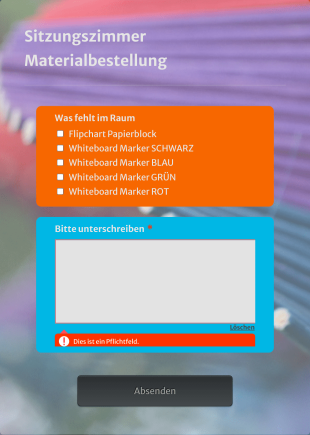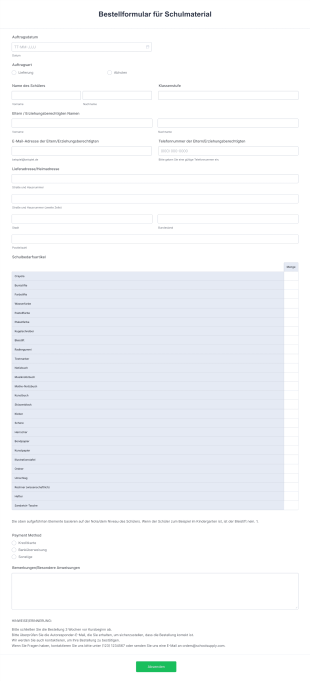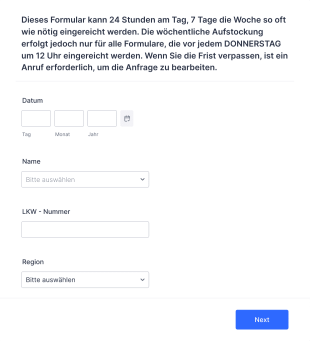Bestellformulare
Über Bestellformulare
Bestellformulare sind für Unternehmen und Organisationen wichtige Werkzeuge, um Kaufanfragen zu erfassen, Transaktionen abzuwickeln und Bestände oder Serviceaufträge effizient zu verwalten. Sie bieten Kunden eine strukturierte Möglichkeit, anzugeben, welche Produkte oder Dienstleistungen sie kaufen möchten, und die erforderlichen Details wie Menge, Lieferpräferenzen und Zahlungsinformationen bereitzustellen. Über das Bestellformular können Kunden ihre Bestellungen direkt beim Verkäufer einreichen. Bestellformulare kommen häufig im E-Commerce, im Einzelhandel, bei Lieferdiensten, beim Event-Ticketing, im Großhandel und sogar in dienstleistungsbasierten Branchen wie Beratungen oder Reparaturservices zum Einsatz. Aufgrund ihrer Vielseitigkeit sind sie sowohl für Online- als auch für Offline-Transaktionen geeignet und optimieren den Kaufprozess für Kunden und Unternehmen.
Mit Jotform wird das Erstellen und Verwalten von Bestellformularen zum nahtlosen Erlebnis. Mithilfe des intuitiven Drag-and-Drop Formulargenerators von Jotform können Benutzer vollständig angepasste Bestellformulare erstellen — ganz ohne Programmierkenntnisse. Sie können Produktlisten hinzufügen, sichere Zahlungsportale integrieren, bedingte Logik für eine dynamische Preisgestaltung einrichten und Benachrichtigungen für Käufer und Verkäufer automatisieren. Alle Antworten werden automatisch in Jotform Tabellen organisiert, sodass es einfach ist, Bestellungen zu verfolgen, den Bestand zu verwalten und Verkaufsdaten zu analysieren. Egal, ob Sie ein Kleinunternehmer sind oder Teil eines großen Unternehmens: Die Bestellformulare von Jotform helfen Ihnen dabei, die Bestellerfassung zu vereinfachen und das Einkaufserlebnis Ihrer Kunden zu verbessern.
Anwendungsfälle für Bestellformulare
Bestellformulare können an eine Vielzahl geschäftlicher Anforderungen angepasst werden. Jedes Formular hat dabei seine individuellen Voraussetzungen und Vorteile. Im Folgenden erfahren Sie, wie sie eingesetzt werden können, wer davon profitiert und wie sich ihre Struktur unterscheiden kann.
1. Mögliche Anwendungsfälle:
- Verkauf von E-Commerce-Produkten (physische oder digitale Güter)
- Speisen- und Getränkebestellungen für Restaurants oder Catering
- Verkauf und Reservierung von Veranstaltungstickets
- Großhandels- oder Großbestellungen
- Servicebuchungen (Beratung, Reparaturen, Termine)
- Verkauf von Fundraising-Artikeln für gemeinnützige Organisationen
- Verwaltung von Abonnements oder wiederkehrenden Bestellungen
2. Lösungsansätze:
- Optimiert den Auftragserfassungsprozess und reduziert manuelle Fehler
- Automatisiert die Zahlungsabwicklung und Auftragsbestätigung
- Zentralisiert Bestelldaten für eine einfache Nachverfolgung und Abwicklung
- Ermöglicht Echtzeit-Bestandsverwaltung und Berichterstellung
- Verbessert das Kundenerlebnis durch sofortige Benachrichtigungen und Quittungen
3. Mögliche Anwender und Nutzer:
- Kleinunternehmer und E-Commerce-Unternehmer
- Restaurantmanager und Cateringkoordinatoren
- Veranstalter und Ticketagenturen
- Großhändler und Vertriebshändler
- Dienstleister (Berater, Reparaturtechniker)
- Gemeinnützige Organisationen, die Spendenaktionen koordinieren
4. Unterschiede in der Erstellung:
- Produktverkauf: Formulare können Produktbilder, Beschreibungen, Mengenauswahl und Zahlungsintegration enthalten.
- Servicebuchungen: Formulare erfordern möglicherweise Datums-/Zeitauswahlfelder, Serviceoptionen und Kundenkontaktdaten.
- Veranstaltungsbestellungen: Formulare könnten Ticketarten, Teilnehmerinformationen und Optionen für Gruppenbuchungen enthalten.
- Großhandelsbestellungen: Formulare können die Eingabe von Großmengen, gestaffelte Preise und Felder für Geschäftskonten ermöglichen.
Zusammenfassend lässt sich sagen, dass Bestellformulare sehr flexibel sind. Sie können an die spezifischen Anforderungen jedes Unternehmens oder jeder Organisation angepasst werden. Dadurch ist eine effiziente und genaue Auftragsabwicklung gewährleistet.
So erstellen Sie ein Bestellformular
Mit Jotform ist das Erstellen eines Bestellformulars ein unkomplizierter Prozess, der sich an jedes Geschäftsszenario anpassen lässt — vom Online-Verkauf von Produkten über die Verwaltung von Servicebuchungen bis hin zum Verkauf von Veranstaltungstickets. Im Folgenden finden Sie eine Schritt-für-Schritt-Anleitung, die Ihnen dabei hilft, ein effektives Bestellformular zu erstellen, das Ihren individuellen Anforderungen entspricht.
1. Beginnen Sie mit der richtigen Vorlage oder einem leeren Formular
- Melden Sie sich bei Ihrem Jotform-Konto an und klicken Sie auf Ihrer Seite „Mein Workspace“ auf „Erstellen“.
- Wählen Sie „Formular“ und entscheiden Sie, ob Sie ganz von vorne beginnen oder eine der über 10.000 Bestellformularvorlagen von Jotform verwenden möchten.
- Wählen Sie ein Layout: Das klassische Formular (alle Fragen auf einer Seite) eignet sich ideal für detaillierte Produktlisten, während das Kartenformular (eine Frage pro Seite) eine schrittweise geführte Nutzung für einfachere Bestellungen bietet.
2. Fügen Sie die wichtigsten Formularelemente hinzu
- Klicken Sie auf das Menü „Element hinzufügen“, um auf die Formularfelder zuzugreifen.
- Für den Verkauf von Produkten verwenden Sie das Feld „Produktliste“, um Artikel zu präsentieren, Bilder hinzuzufügen, Preise festzulegen und die Mengenauswahl zu aktivieren.
- Fügen Sie bei Serviceaufträgen Felder wie Datums-/Zeitauswahl, Dropdown-Menüs für Servicearten und Textfelder für besondere Anweisungen hinzu.
- Integrieren Sie Zahlungsgateways (PayPal, Stripe, Square usw.) über den Tab „Zahlungen“, um Transaktionen sicher abzuwickeln.
- Verwenden Sie Widgets für erweiterte Funktionen wie elektronische Signaturen, Datei-Uploads (für Sonderbestellungen) oder Gutscheincodes.
3. Passen Sie das Formular an Ihre Marke an
- Öffnen Sie den Formulardesigner, indem Sie auf das Symbol des Farbrollers klicken.
- Passen Sie Farben, Schriftarten und Layout an Ihr Branding an.
- Fügen Sie Ihr Firmenlogo hinzu und passen Sie die Formular-URL für ein professionelles Aussehen an.
4. Richten Sie bedingte Logik und Benachrichtigungen ein
- Verwenden Sie bedingte Logik, um Felder basierend auf Benutzerauswahlen ein- oder auszublenden (z. B. Versandoptionen nur anzeigen, wenn „Lieferung“ ausgewählt wurde).
- Richten Sie automatische E-Mails ein, um Bestellungen bei Kunden zu bestätigen, und Benachrichtigungs-E-Mails für Ihr Team.
5. Veröffentlichen und teilen Sie Ihr Bestellformular
- Klicken Sie auf „Veröffentlichen“, um einen teilbaren Link zu erhalten oder das Formular auf Ihrer Website einzubetten.
- Teilen Sie Inhalte per E-Mail, über soziale Medien oder QR-Codes, um Ihre Kunden überall zu erreichen.
6. Testen und Verwalten Sie Ihre Bestellungen.
- Zeigen Sie Ihr Formular in der Vorschau an und übermitteln Sie eine Testbestellung, um sicherzustellen, dass alles reibungslos funktioniert.
- Überwachen Sie Antworten in Jotform Tabellen, wo Sie den Bestellstatus verfolgen, den Bestand verwalten und Daten für weitere Analysen exportieren können.
Mit diesen Schritten erstellen Sie ein individuelles Bestellformular, das Ihren Verkaufsprozess optimiert, manuelle Arbeit reduziert und Ihren Kunden ein reibungsloses Erlebnis bietet. Die flexiblen Funktionen von Jotform stellen sicher, dass sich Ihr Formular an jedes Bestellszenario anpassen lässt — egal, ob Sie Produkte, Dienstleistungen oder Veranstaltungstickets verkaufen.
Häufig gestellte Fragen
1. Was ist ein Bestellformular?
Ein Bestellformular ist ein Dokument oder Online-Formular, mit dem Unternehmen Informationen von Kunden über die von ihnen gewünschten Produkte oder Dienstleistungen sammeln. Es enthält in der Regel Felder für die Auswahl der Artikel, die gewünschte Menge, die Kundendaten und die Zahlungsinformationen.
2. Warum sind Bestellformulare für Unternehmen wichtig?
Bestellformulare helfen Unternehmen dabei, den Einkaufsprozess zu optimieren, manuelle Fehler zu reduzieren und eine genaue Auftragsabwicklung sicherzustellen. Darüber hinaus bieten sie eine klare Dokumentation der Kundenanfragen und ermöglichen eine effiziente Zahlungsabwicklung.
3. Welche Angaben müssen in einem Bestellformular enthalten sein?
Ein Standard-Bestellformular sollte Angaben zu Produkten oder Services, zur Menge, zu den Preisen, zu den Kundenkontaktdaten, zu Liefer- oder Abholoptionen sowie zur Zahlungsmethode enthalten.
4. Gibt es verschiedene Arten von Bestellformularen?
Ja, Bestellformulare können je nach Zweck variieren, wie zum Beispiel Produktbestellformulare, Dienstleistungsbestellformulare, Ticketbestellformulare, Großhandelsbestellformulare und mehr. Jeder Typ kann verschiedene Felder und Layouts erfordern.
5. Wer kann Bestellformulare verwenden?
Bestellformulare werden von vielen verschiedenen Personen und Organisationen genutzt, darunter Einzelhändler, Restaurants, Eventveranstalter, Großhändler, Dienstleister und Non-Profit-Organisationen.
6. Wie helfen Bestellformulare bei der Bestandsverwaltung?
Durch die Zentralisierung von Bestelldaten machen Bestellformulare es einfacher, Lagerbestände zu verfolgen, Verkaufstrends zu überwachen und die Bestandsauffüllung effizient zu verwalten.
7. Sind Online-Bestellformulare zur Zahlungsabwicklung sicher?
Online-Bestellformulare bieten eine sichere Umgebung für die Verarbeitung von Transaktionen und den Schutz von Kundendaten, wenn sie mit sicheren Zahlungsportalen wie PayPal oder Stripe verbunden sind.
8. Lassen sich Bestellformulare an unterschiedliche geschäftliche Anforderungen anpassen?
Selbstverständlich. Mit benutzerdefinierten Feldern, Branding, bedingter Logik und Zahlungsoptionen können Bestellformulare an die spezifischen Anforderungen jedes Unternehmens oder jeder Branche angepasst werden.





































